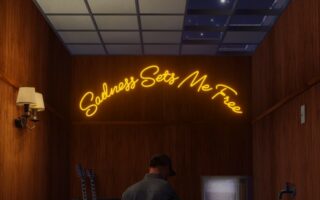
Veterans of more than 30 years in an industry widely recognised for the transient nature of its icons, the Manchester band are old enough to have been Morrissey’s first favourite amour, to then hijack the movement their city gave its name to, and later survive the internal strife only money and serious unit shifting brings.
In fact, they’re so strong in character they’ve managed to escape the unforgiving event horizon that was ‘Sit Down‘, a song anyone of a certain age will have sat on a beer soaked student’s union floor embarrassing themselves to.
For all its forty something ubiquity, it’s also baggage that still acts like musical kryptonite for a whole bunch of people who see Tim Booth and co’s signature moment – whether wanted or not – as the kind of aberration for which there is to be no forgiveness.
And yet, of course, James are no Right Said Fred or Spandau Ballet, endlessly touring their sepia moments only to pour the net gains into one tax avoidance scheme or another: ‘La Petite Mort‘ is their 13th album in total and their fourth of new material since a hiatus which began with Booth’s departure in the early noughties. It’s also one shaped by the deeply cathartic personal experience of the death of his mother, one which the singer dealt with in a typically spiritual manner, channelling the grief and celebration of her life into ten songs that deal with, to use a horrible cliché, real things. This is grown up stuff, but rather than being grimly unlovable, more about affirmation than loneliness and regret.
Occasionally, however, these feelings ripple to the surface, ‘Quicken The Dead‘s exhortations to rejoice echoing the singer’s desire to no longer isolate himself from his close circle, his retort ‘Don’t You Know, We’re Already Dead‘ acting as the appropriate two fingers to the Grim Reaper himself. Given the muse, there can be no surprises that there’s nothing here as anthemic as ‘Born Of Frustration‘ or ‘Sound‘, but on songs such as the elegiac closer ‘All I’m Saying‘ and ‘Walk Like You‘ the maturity and assurance of a band perfectly at home with their familiar dynamics will leave fans gladly content.
The former builds from just that voice – still as richly enticing as ever – to a dazzling, arena size crescendo before a fittingly abrupt end, the sort of marginal, eddying rock at which they excel. The conclusion to be inferred from all this must be that if there’s resignation or a sense of drift that coming closer to mortality is causing in the background, James still remain in performance terms an astute balance of whimsy and directness.
Always too complex then for the pedestal onto which their critics named them, it’s almost churlish to point out to them that on ‘Bitter Virtue‘ their subject matter is the narrow mindedness of religious fundamentalism, whilst ‘Moving On‘ deals with the act of preparing for death, one cycle ending whilst another one (might) begin. Tackling themes like this less than obliquely should win respect even from closed minds, but such a lack of fear is unlikely to sway opinion. Given the under and over currents however, the skillful avoidance of melodrama is the gift of a writer projecting from the heart, and ‘La Petite Mort’s finest moment is via the gorgeous rolling piano of ‘All In My Mind‘, its tenderness a lullaby virtue.
Which brings us to the final question; if James are an institution, are they better off inside looking out? Are the sane people within the walls or outside? ‘La Petite Mort’ wisely doesn’t seek to answer those questions, only to create an atmosphere of understanding.
In-disposable, thoughtful and without ego, it’s proof that there is surely life after the death of others.
(Andy Peterson)



